







SUPPORTING KINGDOM BUILDING
Exploring the cycle of church life
Also in this issue:
Places of peace
Do not resuscitate
Addressing addiction within church communities

Jesus once said, “I tell you the truth, unless a grain of wheat falls to the ground and dies, it remains only a single seed. But if it dies, it produces many seeds” (John 12:24). Jesus was referencing His impending death (and resurrection), pointing His disciples towards the power of what was about to happen and the rich harvest of souls that has resulted.
Generally, we do not like talking about death, and much prefer to talk about life, resurrection and revitalisation. But death is part of life! We all face it, both personally and in other aspects of life. And this can be true of our church situations. Some years ago, I went through the painful experience of closing an independent evangelical fellowship I was coleading in our village.
Many wanted to continue the powerful time we had been enjoying, but the Lord made it clear to us as leaders that we needed to let it die and join with another local church. Looking back, I can see the Lord’s perfect timing on this, as it was at the point when Church Growth Trust was being birthed and I would not have had the time to give to this ministry if I had continued to lead the fellowship.
Only the Lord has the right to take a life, and this applies to our churches as well. He gives and He takes away! He starts and He finishes. The important thing is hearing His voice and knowing what He is saying in our particular situation. I have the privilege of walking with fellowships that are having to consider passing on the baton to the next generation; of letting go and letting God grow the seed into something new, fresh, fruitful and often different. This is usually painful, but it can also be a relief and a blessing, as they realise there is another option than trying against all odds to maintain a diminishing work.
I hope you enjoy reading this edition of Foundations, as we explore
I hope you enjoy reading this edition of Foundations, as we explore the themes of growth, closure and rebirth within church communities, providing hope and encouragement that God is still in control and growing His Church. If this inspires you to talk to us about your situation, please feel free to contact me.
Giles Arnold Chief Executive of Church Growth Trust giles.arnold@churchgrowth.org.uk

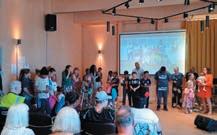
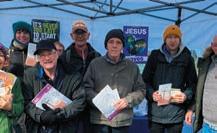



We are delighted to welcome Simon David as the newest trustee of Church Growth Trust. Simon, who lives in Portishead, has been an active member of Gordano Valley Church for 30 years, serving as a trustee and treasurer. He played a key role in establishing the town’s foodbank and has volunteered extensively, including in Romania and near the Ukraine border.
Simon’s career includes roles in management accounts, pensions and as Chief Executive of Haven Community, where he supported adults with complex needs. Now retired, Simon enjoys hill walking, caravanning, photography and motorcycling.

We are pleased to introduce Jonathan Bennett as the new Property Manager at Church Growth Trust. Jonathan lives in Kettering with his wife, Sarah, a Church of England Minister and their two young children.
With extensive experience in commercial and residential property and a law degree, Jonathan is deeply involved in church life and supports Sarah’s ministry. In his spare time, he has a passion for classic cars, cycling, playing the trombone and indulging in all things Lego. We are confident he will be a valuable addition to our team and support our connected church communities.
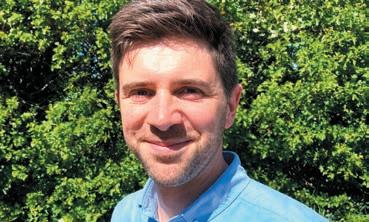
T: 01536 647075
M: 07729 082502
E: jonathan.bennett@churchgrowth.org.uk
Share your good news with us
Church Growth Trust is always looking for good news to share. If you have an encouraging story about the ministry in your area or a building project you are working on, please contact our Communications Manager.
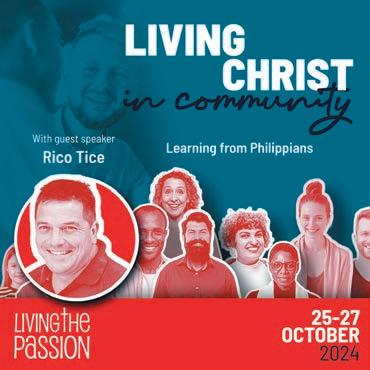
Time is running out to register for “Living the Passion,” a transformative event scheduled for 25-27 October 2024. This event is designed for individuals seeking to deepen their spiritual journey and invigorate their passion for ministry.
Over the three days, participants will engage in dynamic workshops, thought provoking keynote sessions and inspiring worship services led by renowned speakers and facilitators. With limited places remaining, secure your spot soon by visiting the event website. This is your final chance to be part of this enriching and motivational event!
Book online – www.livingthepassion.org

T: 01536 647505
E: sharon.short@churchgrowth.org.uk
A Charitable Incorporated Organisation (CIO) is a relatively new type of legal structure designed specifically for charities in the UK.
It combines the benefits of a corporate structure, such as limited liability for its trustees and a separate legal identity, with the simplicity of operating as a charity. This makes it an attractive option for churches and other charitable organisations looking to formalise their operations while protecting those involved.
There are many reasons why churches might think they do not need to register with the Charity Commission, but Church Growth Trust’s latest Practical Guide is here to clear up some of the common myths on this topic. These include:
• “We do not need to register as a church because our building is a registered place of worship.”
• “We do not have a Trust Deed (or other governing document), so we are not a charity.”
• “Our income is not high enough to require us to register as a charity.”
• “We do not need to register with the Charity Commission because we already have a charity number from Revenue and Customs.”
In most of these cases, these assumptions are not true. In fact, there is often a legal requirement for your church to register as
a charity - especially if your annual income exceeds £5,000, you operate as a charity (where church members give with the expectation that their contributions will be used for charitable purposes), and you are not an excepted charity (e.g., one that falls under a denomination).
At Church Growth Trust, we believe it is not just a good idea for churches to register—it is essential for accountability and making the most of the benefits that come with being a charity.
If you are considering registering as a charity, Church Growth Trust also recommends looking into becoming a CIO. Our practical guide offers clear explanations of why becoming a Charitable Incorporated Organisation might be a great choice for your church, along with key considerations as you navigate the registration process.
Why not take a moment to explore CGT’s Practical Guide now?
It could be just what you need to get started!

By Giles Arnold Chief Executive
Giles has been managing Church Growth Trust since its inception in 2010 and before that worked for Stewardship. He leads the expanding team and is regularly meeting trustees and elders of independent churches, who are considering how CGT can help them with their properties. He works with other sister organisations on a national basis, including with church planting work and revitalisation of churches. He also specialises in advice on church and charity buildings, such as unravelling Trust Deeds.
Looking for straightforward advice on managing your church property? Church Growth Trust has developed a series of Practical Guides tailored to support you. From common building issues to navigating building regulations and ensuring health and safety compliance, these guides are designed to make your role easier. Download them today to share with your team, trustees, or fellow church members.

Recent changes to UK fire safety legislation could impact how your church manages Fire Risk Assessments (FRAs). The Regulatory Reform (Fire Safety) Order 2005 places a legal duty on the ‘Responsible Person’ in charge of a non-domestic building, like a church building, to ensure that a fire risk assessment is conducted.
However, amendments introduced through the Building Safety Act 2022, which came into effect on 1 October 2023, make these responsibilities stricter. Notably, the Responsible Person must now ensure that the FRA is completed by a competent individual with the right training, knowledge and experience. This means churches can no longer rely on internal staff or volunteers to carry out an FRA unless they have the necessary expertise.
In most cases, churches will need to hire a certified professional to perform the FRA. When selecting an assessor, it is important to verify their credentials to ensure they meet the required standards.
Church Growth Trust offers guidance to churches navigating these changes. The recently updated Practical Guide outlines the new regulations and provides advice on how to procure a competent assessor.
For more information, including access to the Practical Guide, visit our website or scan the QR code.


Looking at modern day Birmingham, it is hard to believe that at the end of the eleventh century, it was a hamlet valued at around twenty shillings.

It grew exponentially in the eighteenth century and by the time of the Industrial Revolution, it had been transformed into the industrial heart of the Midlands. Wealthy manufacturers moved out to the countryside with their families as their businesses grew and a number of leafy communities sprang up, one being Hollywood, a large village around nine miles south of Birmingham city centre. Occupying a former Gospel Hall built around seventy years ago is the Hollywood Christian Life Centre (HCLC) which has many stories to tell of its own growth and the wonderful outcomes of the sharing of the Good News.
Steve Crosthwaite has been HCLC’s Pastor for the last ten years.
‘Hollywood is fairly affluent, but it does have pockets of poverty and deprivation. On the

surface, everything looks great, but some of our community struggle with alcohol and drug dependency and there is isolation and loneliness. Our church building is near a lot of former social housing and blocks of flats, and although we tried to connect with that part of the neighbourhood, we had little success until Covid hit. We opened a foodbank in the church and that raised our profile massively for those who were struggling. Since then, the social make-up of the church has altered significantly and we are seeing many more people coming in from our local area.’
HCLC’s foodbank was the beginning of a change in their congregation. ‘We met a guy at the foodbank in lockdown, invited him to church and he never came. However, at Christmas, we saw him at the carol service. He was in his sixties, had spent time in prison and had a background of drugs, violence and crime. He told us that his family thought it was hilarious that he was setting foot in
a church of all places. Having sat through the entire service, he told us that it was the most joyful thing he had ever experienced in his life. Now a regular attendee, he says that he needs to come to church because it is the place that gives him peace in his life. The challenge we face is to reach out to people like him who think that church is not for them, build relationships and show our neighbours the amazing love of Jesus.’
The church is outward-looking and is seeing the fruits of much of its outreach work springing from the seeds planted over the last ten years. Monday Club, a weekly after-school activity, regularly attracts 40-50 primary school age children, most of whom do not attend church. One of the mums was baptised a couple of years ago and is now part of the team. HCLC’s coffee morning attracts more elderly members of the community, some of whom are coming to faith.

Steve and the church community have been intentional in their involvement with the neighbourhood. ‘I’m a governor at the primary school and our Assistant Pastor Gille works with kids at the local high school who are at risk of being excluded. People now come to us, quite naturally, asking for advice and help. They know we love them and that we are here for them.’
As HCLC looks to the future and continue to sow seeds, they are praying for a

Godly harvest and for many more of their neighbours to be saved.
150 miles southeast is the Borough of Barking and Dagenham in East London, within the top 10% most deprived areas nationally. In 1929, as the huge Becontree housing estate was being built, two godly sisters founded Kingsley Hall in memory of their brother. Travelling on a train together from Loughton to the East End of London, they noticed a horrible smell drifting into the carriage. The miasma caused by glue factories and poor sanitation and sewage was simply accepted by everyone. When they asked other passengers about the smell, they replied (rather callously), ‘That is the stench of the poor. Think no more of it.’ Convicted by God that they needed to do something to help, they bought an acre of land and began praying. The Lord moved mightily and many people came to faith. However, by the nineteen nineties, numbers were dwindling and there was resistance to change.
In 2014, when the present Director and Church Leader, Chris Kapnisis moved there from nearby Buckhurst Hill, the vision was to unblock the wells, shake off the dust, open up the space to the community again and reintroduce a culture of prayer and worship, continuing the good work God had done through the two prayerful sisters.
‘We engaged with local council officers,

churches and community partners to make sure we fitted into the existing spiritual landscape. Prayer underpins everything we do. We have redeveloped the site into a new community space with childcare, housing, a prayer house, social supermarket, sports hall and community café as an expression of the Kingdom. The building is now one of the borough’s community hubs, we partner with a number of local agencies including Citizens Advice and many of our staff are mental health first aid trained.’
The team have not forgotten the roots from which this ministry sprang.
‘We kept one part of the original 1931 building as our prayer house at the very centre of the site. It is a peaceful space surrounded by the new community spaces. The redeveloped Livewell Centre has brought £13 million worth of funding into the site of worship, community, educational and housing needs being met. In 2022 we were awarded

the Queen’s Award for Voluntary Service. However, we felt that God wanted to extend the reach and for us to have a borough-wide responsibility.’
And that is where Church Growth Trust (CGT) came in. Charlotte Road Gospel Hall, just under a mile away from Kingsley Hall was built at roughly the same time, but the congregation had dwindled to a handful.
‘We got the keys in May this year,’ Chris explains. ‘The garden was overgrown and the building needed some cosmetic work, but almost immediately, our local community started stepping in to help. They were genuinely delighted to see the space being brought back to life. One lady came in holding a wooden cross and told us that although she wasn’t a believer, she wanted us to have it and to know that she was here for us. We run two worship services a week, a drop-in space and we are going to organise a childcare provision and some food distribution.’
The borough faces challenges around the cost-of-living crisis, mental health and postpandemic issues. Chris is clear that Charlotte Road is not simply an overflow site. Both churches are there to reach out to new people and to share the good news of Christ. Already, wonderful things are happening.
‘One local family was struggling with cramped living conditions, and a couple of kids with autism and additional needs. Every morning, one of the older boys comes over to the church to help out and gets involved with the daily reflection and Bible study. The family have now found a faith and are engaging with services. A local DJ, who suffered from loneliness and isolation comes to hang out at Charlotte Road and attends the services. We say to him, “Are you ready to come to faith yet?” and he answers, “Not yet!” But he still keeps on coming and this is a safe space for him. We are giving Jesus the time and space to do the work.’

Chris and the team have a great relationship with CGT and have reached out to some of the other groups who applied for Charlotte Road. ‘We can all work together for the Gospel and make a difference to this place, drawing on the missional roots put down nearly a century ago.’
Even when a good work has drawn to a close, the Lord has plans to restore and revive it and Charlotte Road in Dagenham is now bringing the good news to its community again, nearly a century after two faithful sisters listened to God and carried out His vision.

By Ruth Leigh
Ruth is a freelance writer who works with a number of Christian charities.



Andrew Conlan continues our series of sharing inspiring stories of church growth and evangelism in the South West

Counties Connect is an initiative that focuses on fostering collaboration among churches with the primary goal of supporting one another in God’s mission to make disciples.
While many churches, like ours, have always understood this mission on a local level—both in their communities and through overseas missions—there has been a growing need to extend this collaboration more broadly, across our regions, counties, and even nationally. This is where the importance of “Connect” comes in, emphasising the need for churches
to unite and work together more effectively. In this article, I want to highlight some of the ways Counties Connect has been making progress in this area, while recognising that much more remains to be done.
One of the key aspects of Counties Connect is its commitment to supporting church leaders. Regular meetings provide a valuable opportunity for leaders to build relationships, share experiences, and offer mutual pastoral support. These gatherings, allow leaders to discuss their challenges, seek advice, and pray together.

At a recent Devon meeting, one leader shared the strain of being the sole leader, and it was heartening to pray specifically for him. This conversation also led to a younger couple from another local church stepping up to assist. Similarly, in Gloucestershire, leaders have benefited from regular confidential meetings for prayer and support, and a seminar on maintaining a mission focus at the leadership level.
Graham Dancy from Abbey Church, Gloucester shares, “Over the last few years, it has been encouraging to meet with other church leaders that are part of Counties Connect (formerly the Partnership network) here in Gloucester. These meetings have been facilitated and hosted by Andrew Conlan every couple of months. Being able to share concerns and struggles and pray together with those in a similar role has been very beneficial.
Counties Connect has also organised various events in our region to consider relevant topics for church leaders, with some excellent presentations and discussions that have helped us as an eldership in guiding some of our decisions around evangelism and discipleship.”
In several areas of Devon, small teams of volunteers from different churches are collaborating with local evangelists for outreach work in conjunction with local churches. At Great Parks Chapel in Torbay, Stevie Walker has formed a team of around 20 volunteers engaged in activities such as doorto-door evangelism and outdoor services. This effort has already resulted in one young man coming to faith and being baptised.
Stevie is also working with other evangelists from Faith Mission and OutreachUK to support local church initiatives. Similar outreach activities are taking place in North and Mid Devon, with Alex Symonds, a Counties associate, working alongside other volunteers in door-to-door evangelism and church support.
Camborne Community Church, Cornwall (CCC), led by Tim and Jacquie Bodman, exemplifies creative and impactful outreach. Tim explains, “We have always tried to think creatively in our evangelism, recognising that traditional approaches might not connect with people today.”
For Christmas and Easter, CCC has developed partnerships with other local churches to organise outdoor events in the town’s main square, each with an evangelistic focus. At the annual Trevithick Day, CCC opens its doors to about 400 visitors, offering face painting, crafts, games, and a free BBQ. This event has sparked numerous Gospel conversations and encouraged some to connect with the church on Sundays.
The church’s ‘Parents and Toddlers’ group and ‘Young@Heart’ initiative further connect with the community. ‘Young@Heart’ includes community activities, a meal, songs, and an epilogue with the Gospel, and has led to the baptism of a 91-year-old who joined through the programme.
CCC also distributes 200 ‘Good News’ papers each month, encouraging congregation members to deliver them to their neighbours, which has sparked additional conversations about faith. During the COVID lockdowns, the church delivered prescriptions and shopping to vulnerable people, including Gospel literature, building rapport with local NHS staff and care home residents.
Tim Bodman reflects, “We seek to be creative and connect with people wherever we can and include the Gospel as often as we can. It’s difficult to measure conversions directly, but many seeds have been sown, and we leave the rest to God.”
Looking ahead, Counties Connect has ambitious plans for 2025 and beyond. These include training and supporting churchbased evangelists, leadership teams, and church planters, as well as equipping entire congregations to share the Gospel with greater confidence. While these plans are substantial, they represent just a small part of the broader mission to preach the Gospel to all. We invite more churches to join in this effort to proclaim the Gospel, see lives transformed, and help churches grow.
A specific goal of a group of Devon church leaders working through Counties Connect is to find, train, and support six individuals to work with existing church fellowships or new church plants in Devon. This ambitious goal depends on God’s grace and the support of the broader Christian community. It will require significant prayer, effort, and teamwork, not just to find leaders but to build small teams committed to each situation.
Some churches we are connected with need revitalisation—they have the infrastructure and a desire to reach their communities but may lack the necessary leaders or people. We also see opportunities for new church plants in areas with no current Gospel witness.
The process is just beginning, but we are already engaging with individuals exploring their calling to Christian service and with churches seeking support.
For more information... or to get involved, please email:
Andrew Conlan, Regional Connector
E: andrew.conlan@countiesuk.org or
Dave Symons, Local Evangelist
E: dave.symons@countiesuk.org

By Andrew Conlan
Andrew Conlan, the Counties South West Regional Connector, has over 20 years of leadership experience at Forefront Community Church in Chard. Originally from near St. Andrews football stadium (and still supporting the Blues), he now resides in Gloucester, where he and his wife Kim serve at Abbey Church, continuing to connect local churches.


Short-term mission teams have been part of the strategy of GLO Europe since the very beginning.
All the way back in 1975, the year after GLO Europe began, they sent two short-term mission teams to Rome to do evangelism during what was Holy Year, each team had 50 team members. GLO was convinced that to fulfil its aim of reaching Europe for Christ, it would need to use a short-term mission. It was also very timely as relations with European countries were improving and


transport was becoming cheaper and more convenient. This strategy clearly worked and over the past 50 years GLO has mobilised more than 15,000 people for evangelism using short-term mission, sending teams to well over 800 locations across Europe and the UK.
However, it should be noted that the use of short-term mission teams is not just about getting numbers; the nature and use of those teams is equally significant. Firstly, GLO Europe ensures that each team is used strategically as part of a bigger mission picture. Sometimes teams are used to pioneer
new areas where GLO has never been before. In this way they can prepare the ground for work that will be done by longer term missionaries. An example of this is the city of Naples in Italy. GLO Europe had a full-time resident mission team there for many years, both church planting and strengthening existing churches in the city. This process began with a six-year campaign in which the first missionaries hosted multiple short-term mission teams every year so as to distribute a Gospel package to every home in the entire city. Given the size of Naples this was a formidable task, but it was achieved through these short-term mission teams and many contacts and some conversions resulted.
Short-term mission teams are also used to help with more established ministries and churches in different locations. A long-term missionary can benefit greatly from the extra help that a short-term mission team can provide. The presence of the team can also provide fellowship for a missionary who may be working on his/her own, and it should also be mentioned the fellowship and the cross fertilisation of ideas that occurs when mission team members mix with, and develop relationships with, church members.

It is a great way of building a bridge between the sending country and churches on the mission field.
However, it should also be stressed that not only are short-term mission teams strategic for the evangelism they do, as well as the support they give to local Christians, but they are also a great blessing to the people who join the short-term mission teams. GLO sees short-term mission teams as a great way of doing discipleship. When one brings a group of Christians together and puts them in the challenging situation of frontline evangelism, it drives them to prayer and reliance on God. This in turn helps them to grow spiritually. Over the years GLO has witnessed so many Christians experiencing real spiritual development and a deeper walk with God as a result of their involvement in short-term mission. It is for this reason that every GLO team has a Bible teacher and that part of each day on the mission is given to studying the Bible and praying together. The depth of fellowship on these teams can also lead to lifelong friendships being formed.

The makeup of teams is also highly significant. Many of GLO’s teams bring people together from different churches and even different church traditions. This has led to an invigorating sharing of ideas and a broadening of perspective among team members. Sometimes however, a whole team can be comprised of people from one church. This is increasingly common. For example, sometimes a youth leader will bring their youth group on a short-term mission team and this enables them to disciple their young people as a group. GLO Europe is delighted
to cooperate with churches in this regard because it knows that the team can ultimately be of great benefit to the church who sends them. People who actively engage with shortterm mission will also get more involved with ministry in their own church. GLO practises evangelism and service as a way of life and encourages team members to become key people in their own churches.
Short-term mission teams do not just involve young people. Most of GLO’s teams have a mix of ages. Stephen McQuoid, GLO Europe’s General Director, says, “one team that I took to France many years ago had a couple of teenagers on it, but also had a lady who was 79 years old and several in between. This mix of ages can also be very beneficial. We have even had some summer teams that have been comprised entirely of retired people. We never cease to be amazed at how God uses these different kinds of teams in different situations. One particular team of mature Christians proved to be a huge support and help to the young missionaries

who hosted them due to the experience they brought to the situation.”
Short-term mission is not all that GLO Europe does. It has long-term missionaries planting churches all over Europe. It also does church-based training across Europe and provides resources for mission, including the resource of experienced practitioners

who can visit, support and mentor Christians serving God is a variety of contexts across Europe. Nevertheless, short-term mission is a key component of what GLO Europe does. Stephen McQuoid again; “It is a great gateway into greater mission involvement as well as a strategic way of reaching people across Europe for Christ. We are delighted to work with churches in order to achieve our aim of evangelising this deeply needy continent of Europe.”
If you would like to send people on a short-term mission team, please get in touch with GLO Europe. You may also have a burden for a particular area in Europe and if that is the case they would happily partner with you by working with you to send a mission team there. You may even want a mission team to come to your church.
T: 01698 263483
E: admin@glo-europe.org

By Stephen McQuoid
Originally from Ireland, Stephen joined GLO in 1990, working with the staff at Tilsley College. Since then, he has taken on the role of General Director of GLO and serves on the boards of several other Christian organisations.


This is a story of faith—of planting a mustard seed of belief, nurturing it, stepping out to see God provide and witnessing the fruits of that faith. It is also a story of renewal, as both a church building and the faith of its congregation are refreshed and re-energised.
Clarence Road Evangelical Church, in East Cowes on the Isle of Wight, is home to a small but welcoming congregation. The church meets in a 1930s hall with Victorian anterooms. The larger church building was demolished and turned into housing when the current assembly purchased the building from the Methodist Church.
Five years ago, Church Growth Trust (CGT) were gifted the building and began
working closely with the church to make improvements. Giles Arnold, CGT’s Chief Executive, first met with the church in 2018 to explore how CGT could assist with a building project. Reflecting on that meeting, he says, “I was so impressed with their level of faith in God and His provision. Even though they were not large in numbers or a wealthy congregation, they believed that God would provide for them with the work to the property. And their faith has been rewarded.”
Peter and Sue Young, church members, recall their early discussions with CGT: “We were inspired by Giles’ enthusiasm and him seeing that mustard seed of faith in us. His spiritual insight and practical approach made it seem possible that the project could happen. And here we are, a few years later, with the building transformed. We are so grateful to God for Church Growth Trust, as we do not think the project would have happened without them.”
The project began with a pressing need for wheelchair access and a better entrance. When Giles first visited, the problem seemed to have no easy solution. After careful consideration, he and John Quinlan, a consultant architect with CGT, determined that the best option was to create access midway up the hill to enter the meeting hall at the correct level. Early plans for comprehensive wheelchair access throughout the building were too costly, so a more affordable design focusing on the hall and entrance was developed.
John Quinlan acknowledges the challenges: “The scale of the project for such a small congregation must have been daunting, and no doubt demoralising as we scaled down the original ideas. But Clarence Road Evangelical Church remained constant in their faith, trusting that with sensible stewardship God would provide. The support from CGT has been invaluable, both to the church and to me as the architect. Without it, I doubt the project would have got off the ground.”


Funding for the project came from the congregation’s sacrificial giving, help with architectural fees from CGT and two significant grants from a closed gospel hall and another Christian charity. The generosity and timing of these gifts were a blessing to the church. Members of the congregation also contributed by organising coffee mornings, selling homemade marmalade and crafting cards. While these activities did not raise large amounts of money, they engaged 19
the church in the project, keeping it at the forefront of their minds and building faith.
After five years of planning, the project has now been completed. A small construction firm was appointed and it soon became clear that most of the team were Christians— another example of God’s provision. The builders ensured subcontractors provided realistic estimates and stayed within budget while exploring cost-effective alternatives. For instance, the flooring required less work than anticipated and the lighting benefitted from a redesign. Construction began in January and was completed by June.
The result? A refreshed building with a new level welcoming entrance, fully accessible WCs, a modern kitchen, better lighting, insulation and carpeting in the worship area. Essential repairs were also made to the rear, three-storey part of the building. The steep street steps at the front were replaced by a gentle ramp to the side, and all facilities— entrance lobby, kitchen, WCs and worship area—are now on one level. The building is not only more accessible but also more welcoming, comfortable and suited for modern use, providing the church with better resources to reach their community.


Sue Young shares her excitement: “I love that we have a worship area without holes in the floor! We also have hot water taps in the kitchen and toilets. These might seem like small things, but they make all the difference.”
Nick Webb, one of the church leaders overseeing the project on behalf of the church, says, “What’s helped me the most is breaking the project into smaller, manageable steps. It’s a reminder that everything doesn’t happen all at once. It’s a sequence; so, we start with design, then planning, quotes and costings. I feel we were just called to keep taking steps along the way, but to do that we had to start with one step, then the next and so on.”
Throughout the construction, locals dropped in to check on the progress, giving the church opportunities to share stories of God’s faithfulness and provision. The church looks forward to hosting a Thanksgiving Weekend in September to connect with the community.
The church delivered invitations to all the nearby streets, inviting people to
visit the building, view displays about its transformation and hear the good news of Jesus, which is the reason they are there as a church. They also asked for ideas on how the building could be used to meet local needs. The church waited a few months after finishing the renovations before hosting open days. This gave them time to get used to the new space and configure the best layout and furniture arrangements. By doing this, they made sure the event would have the greatest impact.
In addition to inviting the local community, the church has also reached out to other local congregations to join them in celebrating their “new” building, receiving tremendous support. This included an interest-free loan from one congregation to cover unexpected costs. This is a beautiful example of local churches working together in unity.
Already, the church is seeing the fruits of the building improvements. Just two weeks after the work was completed, a woman using a wheelchair, who previously could not attend due to the steep steps, entered with ease through the new entrance.
She soon brought her daughter, and now her granddaughter and great-grandchildren attend regularly—a direct result of making the building accessible.
The transformation of the building has also strengthened the faith of the congregation, giving them greater confidence to share their faith and trust that God will grow His Church in East Cowes. Giles Arnold reflects, “We are so delighted that the church building has been transformed and the facilities are now much better for the church’s meetings and outreach. It has been a privilege to work with the church over the past few years, to see their faith rewarded and grown. I know they are expecting God to provide, not only for the building project but also for growing His Church. I can’t wait to hear the next part of this story.”

If you have any questions about your church property or believe CGT can assist with a building project, please contact CGT’s architect, Jonny Heaney. He will be glad to discuss your project and explore how CGT can help bring your vision to life.

Jonny Heaney, Architect
T: 01536 647162
M: 07729 082501
E: jonny.heaney@churchgrowth.org.uk



If you are to pose the question “How can you help a dying church?” in an internet search engine, the resources, books, and responses offered as answers appear to centre on church revitalisation and renewal.
Effectively, they suggest that to keep going, perhaps doing more of the same with a twist of energy and some funky songs is the way forward (I am being deliberately provocative.) The recommendations could be best summarised as praying more, preaching more, planning more, knocking on more doors and inviting more people. Invariably, the advice is to try even harder, perhaps inadvertently suggesting that what has gone on before has not been effective in the first place; thereby increasing guilt in those leading or attending. I confess to finding this approach pastorally insensitive to many congregations and leaders who have tried so hard, and perhaps dismissive of what God is saying.
It is not without a sense of irony that I observe how many denominations have invested over the years in pioneering ministry,
waxing lyrical about church planting and ‘releasing people to lead fresh expressions’ of church. Our theological colleges have bought into this, training pioneers as midwives to birth something new. Yet, institutions often place these ‘midwives’ in a ministry context where the role of a ‘hospice nurse’ is more appropriate. I cannot help but wonder if, alongside the pioneers and planters, we should also seek to train leaders who specialise in hospice-type ministry for congregations, enabling them to die well.
Please hear my heart; I believe churches can thrive when things look bleak. Indeed, there are numerous stories that I could recount where I have seen this happen. Nevertheless, for a faith built on death and resurrection, it would seem that we are not able to grapple with death when it comes to the church. As a friend once commented, “The most missional thing many churches could do is close”. So, why do we resist it? Why are we afraid of death? Is it possible that we link closure with

failure and are, therefore, reluctant to accept it as an option on ‘our watch’?
Ecclesiastes teaches us that there are seasons, or times, for things to happen, such as planting, laughing, dancing, being silent and dying. Indeed, Ecclesiastes 3 is frequently read during funerals. So, if we can accept that death is part of the seasonality of nature and, thereby, God, could it also be the natural course for some congregations?
I am not seeking to interpret every hiccup, struggle, and rough patch as the death rattle of a church. Nevertheless, I think a grownup conversation on church closure is long overdue as, in my experience, churches have a habit of dying badly. Our duty as Christians is to show the world, in light of our hope in Jesus, what it means to die well, including honouring a well-lived life.
I recently had the privilege of interviewing Lucy Honeysett, the Lead Coordinator of Christians in Care, and I was curious to see if there was anything the rural Church might learn from end-of-life care. One of the topics that struck me during our conversation was the subject of resuscitation and a patient’s or family’s wish not to resuscitate. With advances in medicine, much can be done to keep people breathing, but it strikes me that this is very different to being alive. For many who are seriously unwell, resuscitation is rarely successful in the medium to long term, and complications that impact the quality of life are not uncommon. Similarly, I wonder that for some churches, this too may be the case; things have progressed too far, and any attempt to resuscitate or ‘re-vitalise’ to use church language, would simply be too painful and damaging and might not even guarantee longevity. ‘Do not resuscitate’ is not the same as ‘do not treat’; much can still be done to enable patients to be comfortable and not be in pain. Perhaps questions need to be asked about what dying well might look like for

congregations. How might we celebrate the life of the church, giving thanks to God while looking forward to what will be next as the mission of God continues?
Let me offer an example of a good closure by a Catholic congregation in a village in Lincolnshire. The church was established during the Second World War to enable Polish airmen stationed at the airbase in the village to attend mass on a Sunday. The church continued after the war ended and the airbase had closed, with a regular congregation of 40 people as late as 2009, although few were local. Over the years, the congregation declined, with the pandemic and lockdown probably serving as the final chapter in the church’s life. The costs of maintaining the building and ministry outweighed the resources available. A decision was made to close the church by celebrating a final mass (which was a celebration) and then sell the building and adjoining land. The mission of God, however, continues in the village, with local
Christians working together at a community grocery store, providing food, prayer and support. Indeed, some of the Catholic church congregation volunteered and continue to serve today. A significant financial gift from the sale proceeds was then made to this local initiative to support the continuing Christian mission in the village. I love that; it is not a continuing Catholic witness, but an ongoing Christian mission undertaken by the Methodists, Anglicans and non-conformists. This Catholic congregation recognised that the season of God had come to an end for them, but also that the mission of God in the community was ongoing.
I believe there are clues to a season drawing to a close for a congregation, the first being that the church’s original mission has ended. The above example aimed to provide mass for Polish airmen flying out of a WWII airbase. The war had ended, the airbase closed, and the remaining congregation was primarily formed of people outside the local community who travelled in for church; perhaps the second clue to a season drawing to an end.
It seems clear to me that in some situations, and only after prayerful reflection, we may reasonably conclude that attempting to resuscitate would cause more harm than good. The season of God for a congregation may have ended; however, I firmly believe that until the return of Christ, the mission of God for the community will continue. What if, rather than fighting church closure for fear of being perceived as a failure, we accepted the will of God and began to listen together, as churches and congregations, to what the ongoing and emerging mission of God in our community might be, and then joined in with that instead?

By Simon Mattholie, Chief Executive of Rural Ministries
Revd Simon Mattholie has served in a number of rural churches throughout his ministry, and regularly teaches on rural mission. Training as a church planter and evangelist, Simon worked for many years in pastoral leadership and as a mission consultant before taking up the role with RM in 2011.
Rural Ministries partners closely with Church Growth Trust to support churches at various stages of their journey.
They serve as the initial contact, helping congregations explore their potential to remain active.
Their role includes offering ideas, suggestions and support to either revitalise or, when necessary, to discern if the season for a church has come to an end. If a church must close but the mission remains vital, they collaborate with Church Growth Trust to continue the mission in new, meaningful ways.
www.ruralministries.org.uk





How Free! Recovery empowers churches to help people break free from addictive and life controlling struggles
“I am so glad for the safe place you provide for us to be authentic and real and seek God’s healing in God’s way, through His Word, through the example of His precious Son Jesus Christ; my heart is softening bit by bit…” A former participant of Free! Recovery.


Free! Recovery is a Christ-centered ministry dedicated to helping individuals overcome life-controlling struggles through the support of local church communities. Founded over a decade ago in London, Free! Recovery provides biblically based resources for discipleship and recovery. In this story, cofounder Sally Childress shares the personal journey that led her and her husband John to create Free! Recovery, and the transformative role local churches play in breaking the chains of addiction.
This ministry grew out of our own messy lives. John’s journey began with drugs, alcohol and pornography in California. At 21, after losing his mum, he ended up in prison
for drug dealing, where he became a believer. But his struggles did not end there. For years, John battled his addiction, attending 300 mandated Alcoholics Anonymous meetings over five years. Eventually, he made the choice to turn back to God and found a local church. He desired the God of the Bible and Jesus Christ to be his higher power. This was a turning point in his life. The church provided support, accountability and a sense of familythings he could not find in addiction recovery alone. John grew in his understanding of the Bible and developed a deeper, personal relationship with Jesus. For the first time, he no longer needed his addictions to cope.
My story began in the UK, where I struggled with deep depression. My battles were internal, and I developed coping mechanisms to survivecomfort eating, fear, anxiety and a vivid fantasy life that pulled me into isolation. I buried myself in books and study, merely existing. At 23, I had a powerful encounter with my Saviour and came to believe in Him. But soon, the darkness returned, along with my old coping habits. Without the support of local church families, I would have spiralled even further.
To cut a long story short, God led me to Los Angeles to work with gang kids, and later
to Germany as a church-plant missionary. A missionary/counsellor introduced me to biblical counselling and for the first time, I truly learned how to apply God’s Word to my life. Slowly, the depression began to lift, and I discovered the life changing power of discipleship. For the first time, I experienced true freedom!
John and I are deeply convinced that our local church communities can provide the best and long term solutions for those struggling with life controlling addictions. Most of the people, who walk through our doors at Free! Recovery have committed their lives to Jesus but are struggling with putting it into practice in their everyday lives. They may be struggling with drugs, alcohol, gambling or pornography and there are those seemingly smaller life controlling issues; anger, worry, overeating, escapist TV watching, social media, gossip; the list is endless. Imagine if freedom became a lifelong reality for them and for the communities they live in.
Our joint lives helped us birth Free! Recovery, a support group ministry in the middle of London 10 years ago at the All Souls Clubhouse. We began very humbly with two Christian Chinese gamblers around a table with enthusiastic volunteers on a Saturday afternoon.
One of our early participants, Jackie, had a heartbreaking past. She was fostered, abandoned, and suffered horrific abuse, which led her into a life of drugs, prostitution, and alcohol dependence. Despite this, her neighbour kept inviting her to a local church. One day, Jackie accepted the invitation, became a believer and the church embraced her. They helped with food, renovated her flat, provided a safe place to go when she felt tempted, offered financial assistance and training and even ensured someone was with her on benefit days when drug dealers were nearby. Jackie once told me, “When I stay in the Word and pray, I don’t feel like using.” When asked to pray, she focused on building consistency in good habits. Her local church played a key role in her journey to freedom. The local church is the only place that has
the potential to provide both a deeply loving grace filled community and biblical discipleship. The local church is the embodiment of Christ, sharing His love and message of true freedom alongside the tough words, “Go sin no more!” John 8:11 Listen, pray, signpost
You may be thinking about what you can do in your setting. If you need help, reach out to someone, if you have no one close by that you can trust, places like us are useful resources. If you want to help someone else, begin by listening to their story. Many of our churches have begun a Free! Ministry by holding 1-2-1 sessions. A completely new ministry can be daunting, but we encourage you to find those people in your church family who have an interest in this work. Never be afraid of starting small. Everyone can be encouraged to listen, pray and signpost when necessary. Consider joining up with another church in the area and see if there are people who have an interest in starting a ministry like this.
Free! Recovery is now a charity providing resources for the local church, with a vision of establishing biblically focused, Christcentered groups throughout the country and internationally.
Our main tool is a 10-week, Christ-centered discipleship and support group course rooted in the Book of Galatians, which is available to churches for free. We provide everything needed to run the courses, including training and facilitators.
www.freerecovery.org
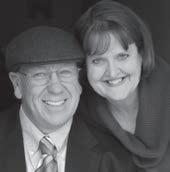
By John & Sally Childress Co-Founders of Free! Recovery

Chief Executive: Giles Arnold
Operations Director: Garryl Willis
Property Manager: Jonathan Bennett
Trustees:
Neil Walker (Chair), Richard Canham, Simon David, Richard Jones, Dan Leafe, Susanna Sanlon, Mark Wallace, Paul Withams.
Church Growth Trust
We are Church Growth Trust
...your experts in church properties. We aim to help independent churches grow by providing a professional and complete church property management service - from trusteeship to architectural support and everything in between. We also directly support church planting and revitalisation through our links with Counties and GLO Europe.
We do this because we want to help independent churches thrive in their mission within the heart of their community by helping to keep church buildings for their original use and fit for purpose. We are passionate about offering our skills, experience and practical support in a way that serves the Church and sees God’s Kingdom grow.
The Barn, 1 Manor Farm Barns, Baines Lane, Seaton, Oakham, LE15 9HP 01536 201339 enquiries@churchgrowth.org.uk www.churchgrowth.org.uk